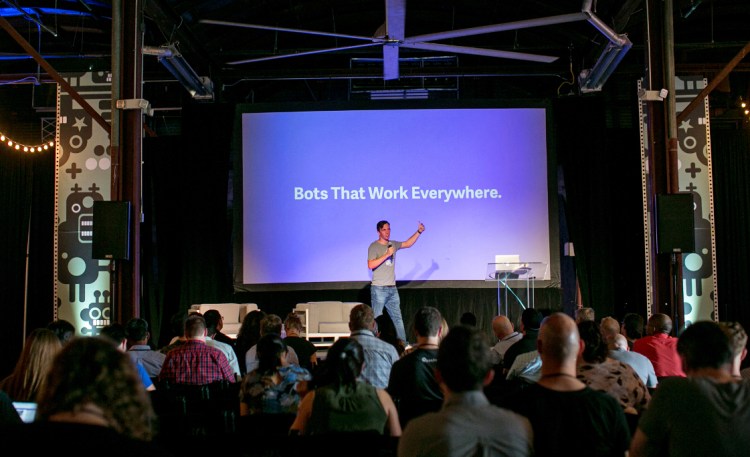Want smarter insights in your inbox? Sign up for our weekly newsletters to get only what matters to enterprise AI, data, and security leaders. Subscribe Now
The main set of tools used to create Microsoft and Slack bots now work together, the companies told VentureBeat this week.
The integration means Microsoft Bot Framework users will be able to make bots for Slack, and Botkit users will be able to bring their bots to additional platforms, like Telegram, Kik, Twilio, and Skype. (Before the change, Botkit was only able to make bots for Slack and Facebook Messenger.)
A web-based Botkit content management system and a Botkit integration with IBM Watson artificial intelligence are planned for release by the end of the year, said Howdy CEO Ben Brown.
Roughly 45,000 developers currently use Microsoft Bot Framework. Howdy declined to state the number of developers using its framework but said it’s in the thousands.
AI Scaling Hits Its Limits
Power caps, rising token costs, and inference delays are reshaping enterprise AI. Join our exclusive salon to discover how top teams are:
- Turning energy into a strategic advantage
- Architecting efficient inference for real throughput gains
- Unlocking competitive ROI with sustainable AI systems
Secure your spot to stay ahead: https://bit.ly/4mwGngO
Botkit was made to create the Howdy task automation bot, now one of the most popular bots in the Slack App Store. When Slack announced plans to open its platform to third parties in December 2015, Botkit was named Slack’s de facto way to make a bot.
Integrations with other platforms will become more important as HipChat, Skype, and others continue to grow enterprise bot ecosystems, Brown said.
You won’t find bots for business in the Microsoft bot directory today, but that may be about to change, according to Microsoft principal software engineer Steve Ickman.
“We have a number of enterprise bots created by Microsoft in development,” Ickman said. “Look for more to come over the next few months.”
Microsoft and Slack are competitors, but the frameworks are working together because at this stage in the still-young bot ecosystem, providing helpful tools for bot developers is more important than competition, Brown said.
“Howdy and the folks at Microsoft are very open to and very interested in a level playing field, but also a better developer experience,” Brown told VentureBeat in a phone interview. “The better the tools, and the more cross-platform and cross-framework the tools can be, the easier it’s going to be for people to actually be successful building bots.”
Howdy and Microsoft Research are part of a group of companies that have been involved in multiple efforts to convene the bot community.
Last week, more than 200 people came together at the Fair Market in Austin for Talkabot, a two-day gathering to discuss challenges, best practices, and bots’ potential to reach billions. More gatherings are being planned for San Francisco, New York, and other cities.
In June, Howdy, Slack, and Microsoft Research took part in Botness, a gathering of dozens of influential chat platforms, investors, and entrepreneurs with a desire to increase collaboration. The next Botness gathering will take place in New York next month.
Both Botkit and Microsoft Bot Framework have made some changes since their launch.
Since the launch of Microsoft Bot Framework in April, integrations have been made for Facebook Messenger and Kik. Though these integrations took place shortly after the launch of the Microsoft Bot Framework, Ickman called Slack “our first external integration” since conversations about a Slack-Microsoft integration began back in April.
Since the launch of Botkit, the framework has added integrations into Twilio enterprise services and natural language processors from API.ai and Microsoft’s LUIS language understanding software.
Howdy may be trying to create the WordPress of enterprise bots, but bot makers still need the likes of Google Analytics, a way to do A/B testing, and other services. There are a number of opportunities to grow businesses between platforms that service a growing ecosystem, Brown said.
“There’s all these services that we know will eventually be relevant because of our history with mobile and web but that are substantially different when applied to bots,” he said. “We think that the ecosystem around and between these messaging platforms is super fertile ground for developers and entrepreneurs.”


